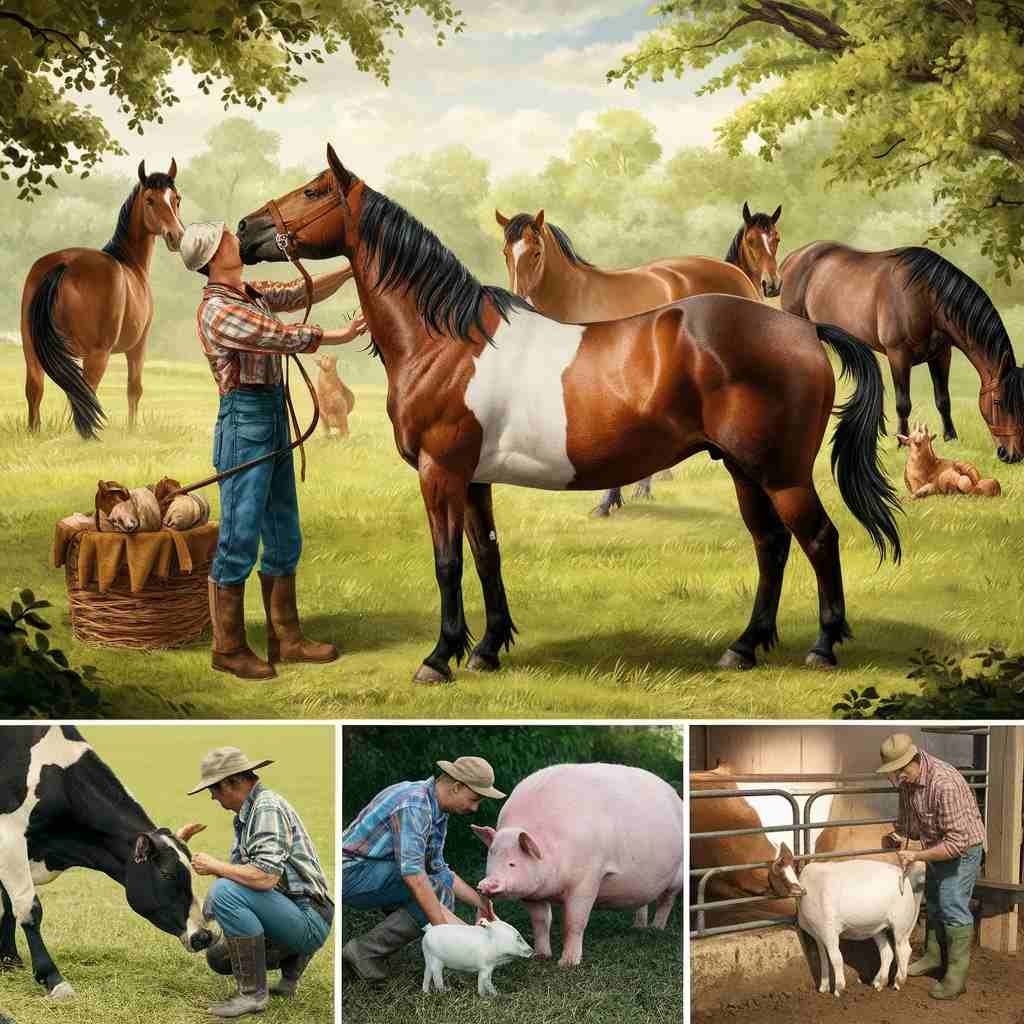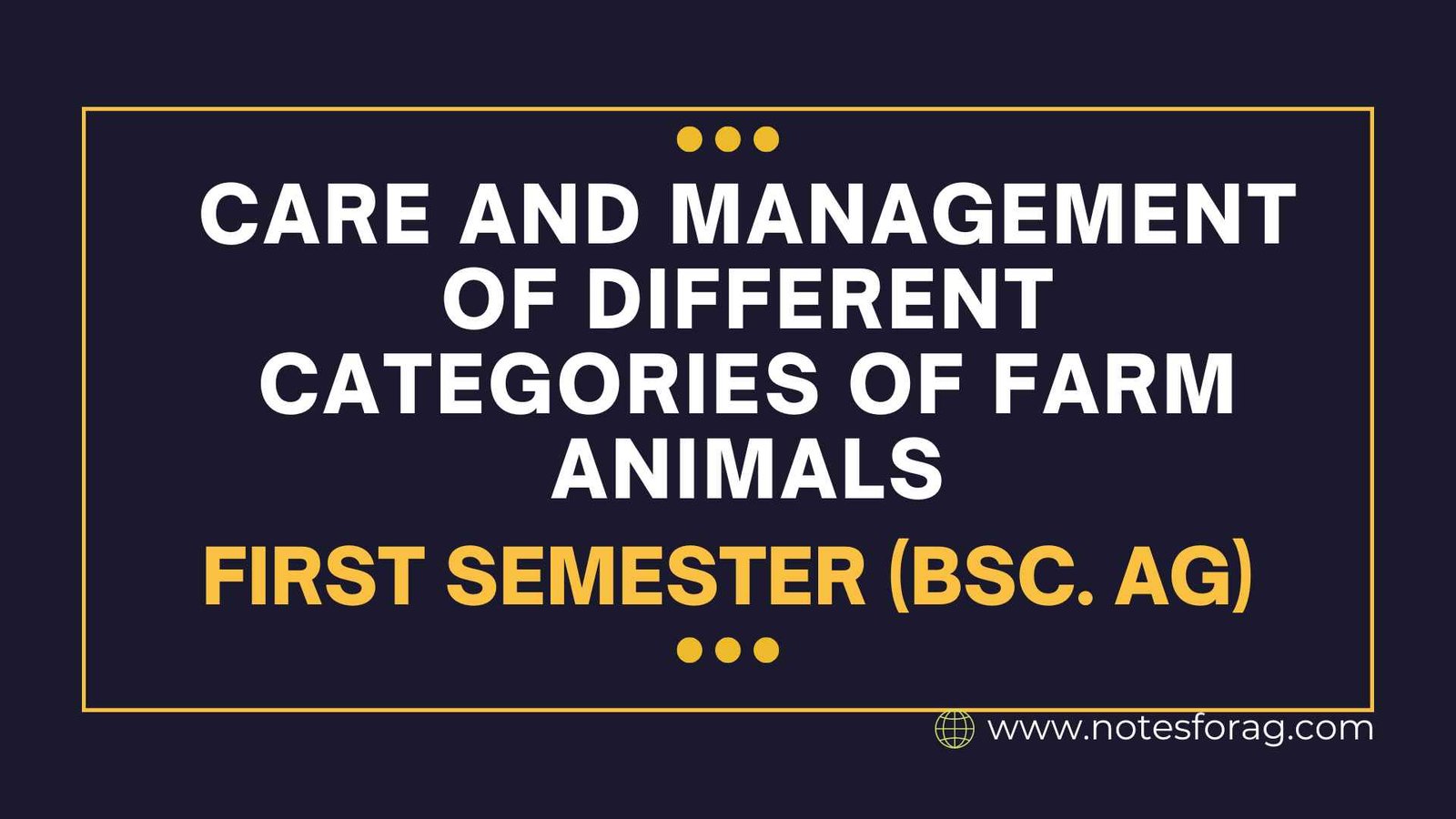The welfare, productivity, and health of farm animals depend on proper care and management. This involves providing cattle with balanced diets, sanitary housing, and routine health examinations. Goats and sheep require regular immunizations, wholesome nutrition, and suitable housing. Large enclosures, a balanced feed, and stringent biosecurity protocols are necessary for pigs.
Vaccination programs, adequate diets, and well-ventilated coops are beneficial to poultry. Horses require frequent veterinarian care, clean stables, and high-quality hay. Clean, aerated habitats with proper nutrition and water quality control are ideal for aquatic species. All things considered, careful observation and compassionate treatment are essential in every category.
Table of Contents
Introduction to Farm Animal Care and Management
Farm animal management and care are essential elements of productive agricultural operations. It is morally right to provide the animals with the care they need, and it is also essential to their wellbeing and production. Providing clean water, a balanced diet, suitable housing, and routine veterinarian treatment are the cornerstones of farm animal care. From sheep and cattle to chickens and pigs, these broad guidelines are applicable to all kinds of agricultural animals.
One element of animal husbandry that cannot be compromised is access to clean water. Dehydration can cause serious health problems and lower farm yield overall. In the same way, eating a balanced diet is essential. The dietary requirements of individual farm animal species must be satisfied in order to promote healthy development, reproduction, and overall well-being.
Using humane animal husbandry techniques has numerous advantages. Raising welfare standards benefits animals in more ways than one, including higher animal well-being and higher productivity. Higher yields of milk, meat, or eggs are more likely to come from healthy animals. Additionally, sustainable farming ensures the ethical and effective use of resources through proper care and management techniques.
The foundation for a more thorough examination of the maintenance and management of particular types of farm animals is laid forth in this introduction. Farmers can strike a healthy balance between requirements for animal care, animal health, and productivity by following these broad guidelines.
Care and management of farm animals
Effective care and management of farm animals vary depending on the species. Here are key practices for different categories:
1. Cattle

- Housing: Provide barns or shelters that are sanitary, dry, and well-ventilated.
- Feeding: Make sure the diet is well-balanced and has enough grains, forage, minerals, and vitamins.
- Health: Vaccinations, parasite control, and routine veterinarian examinations.
- Breeding: Monitor for calving and put in place appropriate breeding strategies.
2. Sheep and Goats
- Housing: Provide shelters to ward off bad weather and scavengers.
- Feeding: Offer hay, high-quality pasture, and extra feed as needed.
- Health: Deworming, regular vaccines, and trimming of the hooves.
- Breeding: Oversee breeding plans and keep an eye out for problems with kidding or lambing.
3. Pigs
- Housing: Make sure your pens are well-ventilated, roomy, and clean.
- Feeding: Provide a diet that is well-balanced and has the right amount of protein, vitamins, and minerals.
- Health: Vaccinations, routine physical examinations, and biosecurity precautions to stave off illness.
- Breeding: Vigilant caretaker of breeding sows and weaning procedures for piglets.
4. Poultry (Chickens, Turkeys, Ducks)
- Housing: Make sure coops have enough room for nests, ventilation, and space.
- Feeding: Provide a nutritious, well-balanced meal that includes grains, proteins, and other necessary elements.
- Health: Establish immunization schedules and biosecurity protocols.
- Breeding: To maintain healthy flocks, use controlled breeding procedures.
5. Horses

- Housing: Roomy, spotless stables or shelters with plenty of space.
- Feeding: Make sure the animal is receiving fresh water, grains, and high-quality hay.
- Health: Vaccinations, dental exams, regular veterinarian treatment, and foot care.
- Exercise: Give people access to pasture and regular exercise.
6. Aquatic Animals (Fish, Shrimp)
- Housing: Keep ponds or tanks well-maintained and aerated.
- Feeding: Give food suitable for the species and keep an eye out for overfeeding.
- Health: Disease surveillance and routine testing of water quality.
- Breeding: Manage the care of fry or larvae and carry out breeding operations.
Effective management and care of farm animals promotes overall health and output. Cattle require hygienic housing, a balanced food, and routine medical examinations. Goats and sheep need regular immunizations, wholesome nutrition, and suitable housing. Pigs gain by having large, well-kept enclosures, a healthy diet, and stringent biosecurity measures. Poultry flourish in coops with good ventilation, a balanced food, and immunization schedules. Horses require frequent veterinarian care, hygienic stables, and high-quality feed. Water quality must be carefully managed and clean, aerated habitats are necessary for aquatic animals. All farm animals need to be handled humanely and with constant supervision to ensure their welfare.
Frequently Asked Question(FAQ)
What are the essential aspects of cattle management?
Clean, dry housing, a balanced feed with enough grass and supplements, routine health examinations, immunizations, parasite control, and appropriate breeding management are all part of cattle management.
What is the proper care and management of animals called?
The proper care and management of animals is called animal husbandry.
Related Articles

